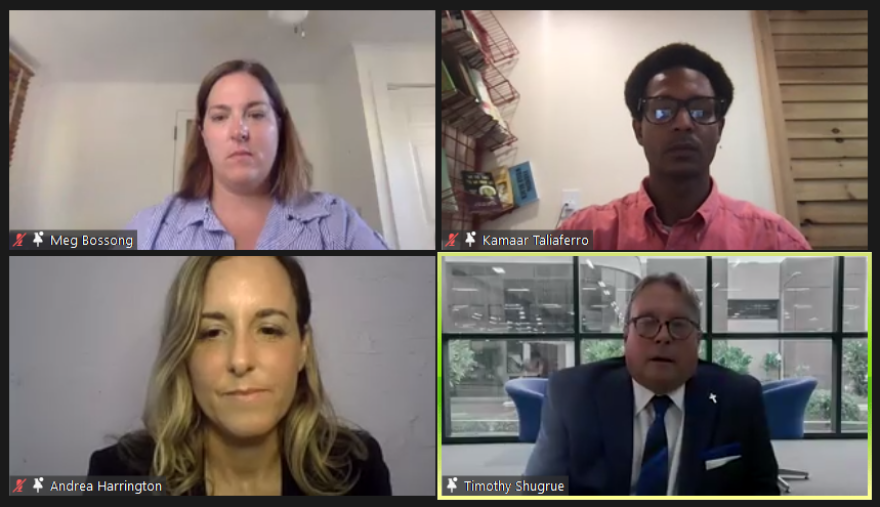The contest pits incumbent Andrea Harrington against challenger Timothy Shugrue. Harrington narrowly became the county’s first female DA in 2018 after a hard-fought campaign on a message of progressivism and reform. Shugrue has been both a prosecutor and defense attorney over a 36-year legal career and is the founder of a countywide organization that advocates for the needs of children who have experienced abuse.
The candidates each expounded on their prosecutorial philosophies.
“If someone has an addiction problem, I don't believe in just – or substance abuse disorder, as we call it now – I don't believe we should just dismiss the case," said Shugrue. "I think that we have an obligation to take care of people that have had substance abuse disorder, and get them through that before we dismiss the case. I believe in doing what I would call smart prosecution, smart justice, which is, if someone's addicted to drugs, let's take our efforts and let's get them off those drugs and help them get employed before we just dismiss the case. Because if you leave an addict out there, it's not an answer.”
“Our decisions should be grounded in fairness and equity, and for me, as part of those decision making processes, we do consider systemic inequities that exist within our society and within the criminal legal system," said Harrington. "So for example, if we have an individual who has committed a crime and if a criminal charge is going to impact their ability to remain in the United States, if they could potentially be reported- Those are the kinds of factors that we do take into account when we are making decisions as far as how we're going to approach a particular case.”
A question about whether their DA’s office would work with U.S. Immigration and Customs Enforcement, ICE, drew out differences between the incumbent and the challenger.
“So it depends on the severity of the particular crime. If someone is charged with a minor drug offense and ICE wants to come and take them, then I don't think it's appropriate for us to do that," said Shugrue. "However, if it's a case that it's a very serious, violent felon and then a conviction gets happened, I think we have an obligation at that point time to assist- not assist, but notify, that's all, we're not going to assist them, but notify them. But that's again, you got to take a look at every single case. We should not be doing blanket policies. We should not be doing that, this is what we're going to be doing all across the board. Every case should be looked at individually. Every person is different, every fact pattern is different.”
“One of our most critical goals is to build trust with the community," said Harrington. "And the immigrant community is a community that is particularly distrustful of law enforcement, and it limits our ability to be able to investigate cases. That vulnerable population is less likely to report if they've been victims of crime. So my message to the immigrant community and to the community at large is very clearly, unequivocally, my office does not cooperate with ICE. We do not notify ICE of anything about our cases at all, ever. That is our policy. It is a very firm policy, all of our prosecutors know what the policy is.”
After the recent expansion of dangerousness laws in Massachusetts, Harrington and Shugrue were asked about the use of dangerousness hearings, which can be used to hold people pre-trial with no recourse.
One of Harrington’s earliest moves in office was to steer it away from using cash bail, which led to Berkshire County CourtWatch observing a sharp rise in non-bail detention as early as 2019.
“We do use dangerousness in order to hold people pretrial, who the courts find to be dangerous," said the DA. "It's limited to people who have committed violent crimes. I do think that it's an important tool for public safety. I think that in order for people to support criminal justice reform, they need to be safe, they need to feel safe. Most of the cases we use it in are domestic violence cases. I do recognize that there needs to be a lot of scrutiny around the use of dangerousness hearings, but people are provided due process, they have counsel. We have to meet a pretty stringent standard in order to convince a judge to hold people pretrial.”
Shugrue said he’s concerned with both the practice of dangerousness detentions and the recent expansion to the law.
“When someone's held on dangerous experience, if it's in a district court, it's 120 days," he said. "In the superior court it’s 180 days. You get held without any rights of bail. You can't post anything. It's a punishment aspect in some aspects. So I have a real problem with the misuse of the dangerousness statute. I do agree that we could include more offenses that were, that are sexual assaults, child abuse cases, those kind of things. But to say that now we're going to talk about a person's past criminal history and implement that with dangerousness, because currently, you can only talk about the offense itself, is that offense dangerous. If it is, then that person should potentially be held on dangerousness, but it's being misused. Instead of bail, which was, you know, it could be appropriate in some circumstances, certainly not in misdemeanors, but to ensure appearance was coming into court, and that’s one thing. But what's happening here is, there’s racial inequality in this bill, and it's been recognized as that.”
You can hear the full forum here:








